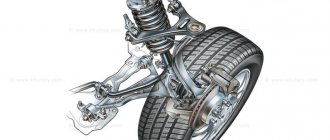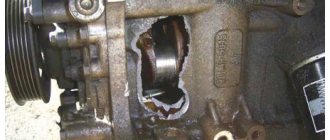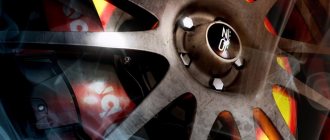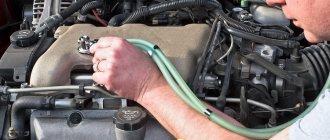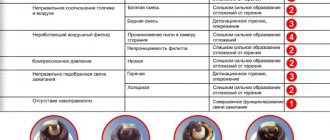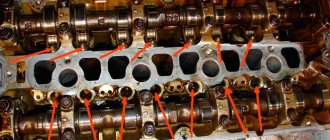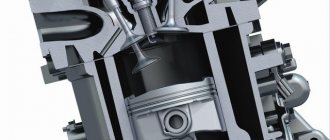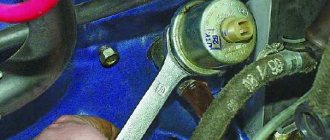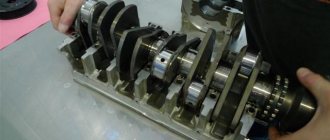A knocking sound when the engine is hot is almost always a symptom of a serious problem. When the engine is warm, not only hydraulic compensators, unadjusted valves or a timing chain can knock, but also connecting rods, main bearings, or a cracked piston pin, and even a piston that has cracks on its skirt. In any case, it is better to carry out diagnostics not in a garage, but by turning to a car service center for help, since most likely you will need to disassemble the engine.
| Engine operating mode | Causes of knocking |
| Knock at idle |
|
| Knocking noise when under load and increasing rpm |
|
Main reasons
Knocking in the engine is an unpleasant phenomenon, and many people associate it with large waste. If you take timely measures, you can get by with a minimum of money spent, since there are dozens of parts in the design of the motor, then almost every one of them can make noise. The main causes of knocking are:
- insufficient oil level in the crankcase;
- Constantly high loads on the internal combustion engine, which leads to accelerated wear and the appearance of gaps;
- regular overheating;
- using low quality oil.
All this can cause a breakdown of a particular unit, which will make a characteristic knocking noise and, accordingly, lead to a number of other consequences.
Why you shouldn't drive with knocking valves
Many car owners believe that knocking valves do not pose a great danger to the engine, and the only negative here is the unpleasant sound. It should be noted that this is fundamentally incorrect, and in any case, even if the knocking cannot be eliminated, it is necessary to understand the cause of the motor noise.
If there is too much clearance in the valves, the cylinders of the internal combustion engine are not fully filled with the air-fuel mixture, and therefore engine power is lost. In addition, due to the increased gap, intense wear of the timing parts begins to occur, for example, the ends of the valves themselves grind off, and wear appears on the pushers. There are known cases when, on VAZ 2108-09 car engines, adjusting washers flew out due to a large gap, and then the camshaft was the first to fail.
You should also not drive with knocking hydraulic compensators, at least for a long time. If the gap between the valve and the r/shaft is very large, the cylinder in the engine does not work fully, and intensive wear of the camshaft cam occurs. There are cases when, due to poor hydraulic compensators, valves become loose and the piston bottom is pierced by the valve. True, this happens quite rarely, however, it is better not to risk it and change the hydraulic compensators in a timely manner.
Diagnosing the problem
The first thing any driver can do is determine when exactly the knocking noise occurs.
Here you may encounter several knocking situations:
- immediately when cold (immediately after turning on the engine);
- after warming up to hot;
- only at idle speed;
- knocking noise under load.
We will consider each situation separately below. A popular question among motorists is how to determine what is knocking in the engine. Here you can use a stethoscope or a homemade equivalent. It will help localize the problem with relatively high accuracy. It will be enough for you to put your ear to the unit to immediately understand that it is the culprit.
Engine knocking when cold
If you hear a dull knock when starting the engine, the cause is the crankshaft. It is in the first minutes that the sound is heard as clearly as possible, since the oil has not yet warmed up and, accordingly, has not lubricated this part. Over time, the sound disappears, but it can still be heard at idle. The knock, as was said, is dull, but its sonority can increase with increasing speed.
The main reason is severe wear of the shaft bearings, which leads to a large gap. The situation is further worsened by the use of low-quality oil with various impurities. The only way you can diagnose whether the crankshaft is the cause is at a specialized car service center by disassembling the engine. Repairs can be done by boring the crankshaft, but in particularly advanced cases, drivers will have to fork out money for a new part.
Also, another reason for knocking when cold is a malfunction of the camshaft. If the camshaft is heavily worn, of course, you will clearly hear sounds even after the car has warmed up. Also, the knocking frequency of this element is half the speed of the motor itself. This fact will additionally help with diagnosis. The reasons are similar to those described above: oil starvation, use of counterfeit products and increased wear of bearings.
Knocking from the camshaft is especially dangerous in cars equipped with hydraulic compensators. The problem is that they will compensate for the gap created between the pushrod and the camshaft, causing the valves to be misaligned. The result will be a drop in compression, a decrease in power and increased fuel consumption. To check the camshaft, you will have to disassemble the engine. If you do not have such skills, contact a car service.
Often the source of noise is the timing chain. In systems with hydraulic tension, oil may not flow immediately, which leads to knocking. The hydraulic compensators themselves can also “click.” In this case, they must be replaced immediately.
Why does the engine start knocking?
First of all, you need to understand that both the engine itself and the attachments can knock. For example, the owner may hear noise and knocking from the pump, generator, power steering pump, etc. If we talk about the engine itself, knocking noises can appear as a result of wear or damage to the connecting rod bearings, pistons, in case of problems with the timing belt, etc.
So, if knocking suddenly appears in the engine, the main reasons may be:
- decrease in engine oil level or loss of its properties;
- the engine began to overheat for one reason or another;
- the power unit is worn out, there are problems with the CPG and the crankshaft;
It is also important to consider whether the engine knocks only when it is cold and/or when it is hot. It is also important to determine whether such a knock is intermittent or constant. The fact is that the power unit does not always knock constantly.
- Often knocking noises are heard only when cold, but disappear after warming up. Note that in this case, on some internal combustion engines, the knocking of the pistons in the cylinders is heard when cold. The reason is that the cylinder liners are worn out, which leads to the formation of a gap between the piston and the cylinder wall.
However, given that the pistons are aluminum, they expand after warming up. It is not difficult to guess that after expansion the gap becomes smaller and the knocking in the engine disappears when it is hot. Also, on a cold engine, the timing chain may make noise.
The fact is that the oil pressure after starting the internal combustion engine is insufficient. If a hydraulic timing chain tensioner is designed, the tension is simply not enough and noise appears, which will disappear with warming up.
Hydraulic compensators often knock when cold, and this is considered normal. If the knocking sound of the hydraulic valve does not disappear after warming up, and changing the oil and flushing the lubrication system does not help, then the hydraulic compensators need to be changed.
- Now let's move on to the problem of engine knocking after reaching operating temperatures. Let us immediately note that if the engine knocks “when hot,” the problems may be more serious compared to the noise of an unheated internal combustion engine.
First of all, the crankshaft or CPG parts may be knocking. This indicates a lot of wear. In a nutshell, while the engine is cold, the oil is less fluid and not as diluted. In fact, the lubricant fills the gaps that have increased due to wear.
As a result, there is no knocking in the mating pairs after starting a cold engine. However, as the power plant warms up, the oil becomes liquid and knocking begins to appear, quite clearly.
More precisely, a knocking sound in the engine when hot indicates that the gap is increased in the area of the main bearings (between the main bearings and the crankshaft journals). Also, the clearances can be increased in the connecting rod bearings, although in practice in this case a metallic knock is more often heard in the engine, regardless of whether the engine is cold or warm.
Knocking when hot can also occur when the piston pin cracks, or if cracks have formed on the piston skirt. One way or another, a knocking sound in the engine after warming up requires stopping operation and immediate diagnosis.
- Another common problem is engine knocking at idle, that is, when the engine (regardless of the degree of warming up) is idling. If you raise the speed, the knocks and noises disappear or become less intense.
Let us immediately note that knocking at idle can indicate either that a part is touching another due to vibrations (for example, covers, casings, etc. may be knocking), as well as backlash in various pulleys, gears and drives.
As you can see, there are many reasons for engine knocking, for this reason it is important to localize the source as accurately as possible. Now let's look at the most common problems and look at the most common sources of engine noise in more detail.
Knock in the cylinder head
Usually, when it comes to knocking in the cylinder head area, valves or hydraulic compensators are most often knocking. Also, valve knocking can be heard on engines with hydraulic valves, and not only in units that have mechanical valve drives.
One way or another, the knocking of hydraulic compensators must be eliminated with an additive, flushing or replacement, and the valves must be adjusted. If these procedures do not help, then there is a high probability of wear on the camshaft cams.
There may also be a gap between the pusher and the seat, the end of the valve is worn, the adjusting washers have become unusable, etc. Even in the timing belt, noises and knocks are often produced by the chain; in belt-driven mechanisms, tension rollers often fail.
It should be remembered that the valve bushings and seats wear out in the head, and the camshaft bed gradually develops. The knocks on the cylinder head themselves can vary in tone from ringing high-frequency to low and rumbling.
It is important to understand that driving with knocks and noises in the gas distribution mechanism is unacceptable for a number of reasons. For example, increased gaps worsen the tightness of the combustion chamber, the engine loses power, and rapid wear of timing parts is noted.
If the gaps are too large, the shims may fly out, causing the camshaft, etc. to become unusable. When the hydraulic compensators knock, the camshaft cams wear out greatly.
Knock in the engine block
The appearance of a knock, especially if the knock is localized in the lower part of the engine, often indicates problems with the crankshaft. Such knocks indicate a serious breakdown; the engine must be stopped operating. Otherwise, the crankshaft may become unusable.
If the connecting rod bearings are knocking, further driving will lead to the connecting rod cap being torn off, and then the cylinder block will be broken. In this case, it may be necessary to replace the entire engine with a contract one.
The knock of the connecting rod journals is metallic and sharp, especially if you press the gas. Also in such a situation, the oil pressure drops and the oil pressure light on the instrument panel lights up. A decrease in pressure leads to the fact that the engine can seize after just a few minutes of operation under load.
The crankshaft journals may also knock. This kind of knock is lower, vibration goes through the engine. The reason is that as a result of wear on the main journals, a gap appears between the crankshaft journals and the supports in the block. This type of knocking noise may also appear due to low pressure in the lubrication system, which leads to scoring on the shaft journals.
Note that if the problem is in the main journals of the shaft, you can get to the repair site under your own power, which cannot be said about knocking connecting rod bearings. However, even in this case, no serious loads can be placed on the internal combustion engine, and the engine itself must be repaired immediately.
Now let's move on to the CPG. If the piston group begins to knock, this indicates an increase in the gap between the piston and the cylinder, as well as the occurrence of defects both on the liner and on the piston itself.
It should also be noted that the cause of knocking can also be the piston pin and its connection with the connecting rod. For example, if the pin is pulled out of the piston, then it can hit the cylinder wall. The reason is insufficient pressing of the pin or the stopper on the piston has flown out (depending on the type of fit of the piston pin on a particular internal combustion engine, which can be “hot” and “floating”).
Noises and knocks in internal combustion engine attachments
As mentioned above, it is not the engine itself that can knock, but its attachments. The fact is that in the power plant the pump, starter, generator, etc. may make noise or knock. Also, possible problems with the gearbox should not be ruled out.
We also recommend reading the article on how to accurately determine what is knocking in the engine. From this article you will learn about the various available methods for diagnosing and identifying knocks and noises in the internal combustion engine.
In this case, diagnosing the problem is easier than in the case of the engine. To check, you need to remove the belt from one or another unit, and then evaluate the noise level by starting the internal combustion engine. Also, after removing the belt, you should rotate the shafts and pulleys to accurately determine the source of the knocking or noise.
Knocking in the engine when hot
While the engine is cold and the oil is not warmed up, the gaps in the parts do not manifest themselves in any way. The knocking noise becomes more pronounced as the oil thins. There may be several reasons:
- increased gap between the crankshaft journal and the main bearings;
- in connecting rod bearings when a sufficiently large gap is formed between the crankshaft journal and the support;
- when cracks appear in the piston skirt or the piston pin itself.
It is possible to diagnose which of the above options leads to knocking only by disassembling the engine. Here you will need the help of a real specialist. Disassembling an engine is one thing, but repairing the breakdown and putting it back together is a completely different task. If you don’t have special skills, you shouldn’t risk doing repairs yourself.
The most dangerous causes of knocking
1. Pistons are knocking in the cylinders.
The knocking of the piston, distinguished by a dull tone, is clearly audible in the cylinder block and is sometimes accompanied by a kind of clicking sound.
The engine knocks and clatters as a result of thermal expansion of the piston, usually “in the cold,” at low engine speeds, as well as when the gas is suddenly released while driving. A knock occurs as soon as the gap becomes larger than 0.3 mm. 2. The piston pins are knocking.
The sound of the piston pins knocking is “metallic”, high-pitched and slightly ringing. This sound is clearly audible if you over-throttle or press the accelerator hard to accelerate. The place where the sound occurs is considered to be the cylinder block; the gap is about 0.1 mm.
The malfunction can also be determined by unscrewing the spark plug. Without a spark plug, the fuel in the cylinder does not burn, which means there is no load on the piston.
Detonation often occurs due to the use of fuel that is unsuitable for this type of engine, as well as during extreme overloads (steep uphill, long descent).
3. Main bearings and crankshaft liners are knocking.
The metallic knock of the engine, characteristic of this case, is a little muffled and is heard from the crankcase. Knocking elements are especially audible at low speeds of a “cold” engine during acceleration and at the moment of releasing the gas. The size of the gap between the neck and the liner is equal to the minimum 0.1-0.2 mm. A drop in oil pressure to a critical level makes the sound louder, regardless of the operating mode.
Often, valve knocking is caused by the use of low quality motor oil, or one that does not match the type of power unit.
4. Connecting rod bearings are knocking.
The sound of faulty connecting rod bearings is similar to signs of main bearing problems, but is more distinct. If the sound intensity increases, repairs must be made urgently. Operation of both gasoline and diesel engines with unsuitable connecting rod bearings is prohibited - the engine may “seize” at any time.
Extraneous sounds when idling
Knocking at idle is not that dangerous, so don't panic right away. However, it is recommended to promptly diagnose the problem to eliminate the problem. As the speed increases, the noise may disappear or remain barely audible. It's worth checking here:
- pump and generator pulley;
- engine protection and timing case;
- camshaft gears for backlash (if they are provided for by the design);
- crankshaft pulley.
There are cases (especially in cars with an automatic transmission) when a crack appears in the flywheel. It will not be possible to eliminate it. Here you will have to replace the entire flywheel.
Under load on the motor
Another fairly common situation is the appearance of knocking only under load. The main reason for engine knocking in such a situation is the appearance of detonation. Gasoline or diesel may ignite before the required moment, which leads to incorrect operation of the entire internal combustion engine. During detonation, you will hear a frequent and loud knock, which will clearly manifest itself in the following situations:
- during acceleration of the vehicle;
- when the driver uses a gear that is too high and does not correspond to the load on the engine;
- when driving with a large load or trailer.
Sufficiently experienced drivers can always detect the sound of detonation. Also, a number of cars are equipped with a special sensor that informs about this phenomenon. You will usually see an illuminated Check Engine light on your dashboard. One of the main causes of detonation is the use of low-quality fuel with a low octane number. During detonation, deposits will form on the cylinder walls, which, even after using high-quality gasoline, will cause a number of problems. At the same time, the work of inexperienced auto mechanics can lead to an increased compression ratio, as well as incorrect functioning of some engine components.
Renault diesel engine problems
Four-cylinder DCi diesel engines with a volume of 1.5/1.9/2.2 liters, produced from 2001 to 2009, are not very reliable. The main problem with these power units is the knocking noise that occurs in the crank mechanism. These motors must not be overheated or overloaded; the engine oil must be changed promptly. The K9K 1.5 liter internal combustion engine is considered the weakest; it can turn the connecting rod bearings already at a mileage of 130-150 thousand km.
It should be noted that gasoline engines are much more reliable - the crank mechanism is problem-free, and the crankshaft fails on them only when starved of oil or when using low-quality engine oil.
Loud knock in any conditions
If you hear distinct sounds at the top of the engine under any load, even at idle, then the problem is the valves. The tone of the sound may vary depending on engine operation. The reason for this is natural wear and tear of the valves. In some cases, it is enough just to make a quality adjustment. If the wear is too great, replacement is necessary.
On certain engines, knocking is caused by contact of the valves with the piston. This occurs because the timing belt is off by one or more notches. We recommend checking its tension and correct positioning. This is done using special marks. Be careful as this problem can eventually lead to complete destruction of the valves or damage to the cylinder.
Malfunctions of the gas distribution mechanism
Breakage or wear of the main elements in the timing system may also be accompanied by knocking noises. Let's look at the most common causes of extraneous sounds.
Valves
Problems with the valves are indicated by a loud knocking sound at the very top of the internal combustion engine. The frequency of such a knock is quite intense, and exceeds in degree the frequency of the crankshaft. Problems can be natural, for example, when starting the engine when cold. An increase in thermal gaps can also occur due to lack of proper vehicle maintenance. Gradually, all this can lead to burnout of the exhaust valve, after which a complete replacement of the part will be required.
Important! If a loud clattering sound is heard under the valve cover, that is, a crackling sound comes from several elements, then this may indicate a breakdown of several valves at once.
Hydraulic compensators
The devices are designed to automatically adjust the clearances in internal combustion engine valves. The reasons for knocking on them can be different. If knocking is heard after stopping the engine, but not while driving, then most likely there is not enough oil level. You can get rid of the knocking by adding oil. If the noise is constant and loud, the defective part will need to be repaired or replaced.
Camshaft drive
The breakdown is accompanied by very strong extraneous noise. This usually happens when the grease on the belt roller bearings has dried out and the raceways and balls have begun to crumble. This situation can lead not only to jamming of the rollers, but also to a break in the timing belt. This can be avoided by timely replacement of bearings or their regular maintenance.
Tensioner shoes
The metal or plastic timing chain device that transmits and distributes the load from the tensioner wears out over time. Such wear manifests itself as a characteristic ringing noise. Sometimes the cracking sounds like a clang, which indicates extreme wear of the part. This can lead to the chain “jumping”, and then the worst thing for the car owner can happen - a bent valve. Also, wear products very often contaminate the oil system.
A number of other reasons
Other components that have not yet been described can also cause knocking. This list includes:
- Fuel pump drive. You will hear a loud knocking sound similar to the sound from the valves.
- Connecting rods knocking due to worn bearings. By turning off the cylinders one by one, you can diagnose the problem.
- Incorrect cylinder block gasket dimensions. It protrudes into the combustion chamber, where it is touched by the cylinder. Characterized by a dull sound.
- Plunger pairs. They can make noise in diesel units. Not critical.
The complexity of the motor design makes diagnosis and repair a complex process. The best option is a trip to a specialized technical center. As a rule, such workshops have all the necessary equipment that will help identify the cause of the knocking. If the car has an electronic control unit, you can additionally perform computer diagnostics.
Reliability of Toyota engines
Among the Toyota line of power units, diesel engines are also considered the most “flimsy”, and this is the 2AD series internal combustion engine. The AD engine family first appeared in 2006; the engines were equipped in passenger car models such as Toyota Corolla/ Auris/ Avensis, Lexus Is, and they were also included in RAV4 SUVs.
2AD engines have a volume of 2.2 liters and a power of 149 or 177 hp. With.
The main problem of the Toyota engine is the burnout of the cylinder head gasket with all the ensuing consequences:
- the appearance of cracks in the block head;
- piston knocking due to overheating.
Scores appear on the piston group, and burnout of the pistons in the area of the jumpers for the rings is also possible. Since the 2AD cylinder block is aluminum, it is almost impossible to reliner it, and if the cylinder liners are significantly damaged, it is necessary to replace the BC or the entire engine.
But Toyota also has very reliable power units - these are the 1JZ and 2JZ series models, which could run one million kilometers without a single overhaul. Unfortunately, these internal combustion engines have not been produced since 2007; now the policy of automobile companies is not aimed at increasing the service life of vehicle components and parts.
Prevention measures
In order not to spend huge amounts of money on diagnostics and repairs, it is better to prevent any problem. Everyone is familiar with the recommendations:
- Regularly undergo technical inspection. This will allow problems to be identified at an early stage.
- Change the oil every 10-15 thousand kilometers. Use only products recommended by the vehicle manufacturer. You can find the information you need in the vehicle's owner's manual.
- Use high quality gasoline. If you need to fill your car with 95 or more, you shouldn’t risk using 92 for the sake of saving.
Remember that spending on motor oil or fuel is simply not commensurate with major engine repairs. The knock indicates an obvious problem, and if it is not dealt with, the consequences will not follow.
Diagnostic and repair methods
To check the hydraulic lifters, you need to remove the valve cover. The cam of the hydraulic compensator being tested should be facing its body with the back side (pressure is not applied). Since none of the service documentation indicates what pressing force of the hydraulic pusher is considered normal, you need to carry out the procedure with all hydraulic modules. Using the comparison method, even without experience in repairing internal combustion engines, you can identify a faulty hydraulic compensator.
Some people manage to eliminate the knocking of hydraulic compensators by washing them, removing carbon deposits and varnish deposits from the internal surfaces.
But it is worth noting that not all types of structures are amenable to such repairs. Since the procedure for replacing hydraulic cylinders is quite expensive, we recommend installing exclusively new hydraulic cylinders instead of faulty ones. Manufacturers do not provide spare parts for repairing hydraulic modules. Seal
